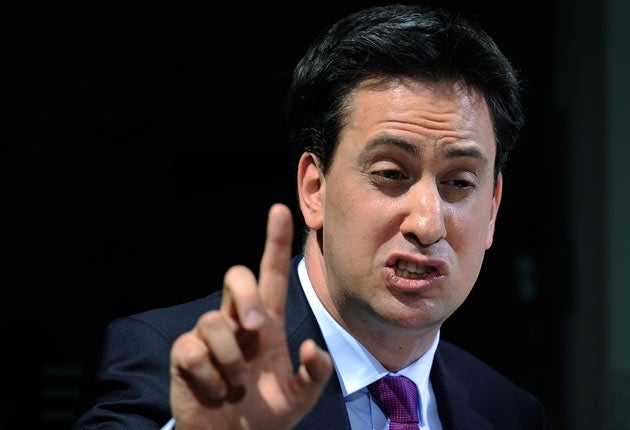Miliband must find his voice – and quickly

Your support helps us to tell the story
From reproductive rights to climate change to Big Tech, The Independent is on the ground when the story is developing. Whether it's investigating the financials of Elon Musk's pro-Trump PAC or producing our latest documentary, 'The A Word', which shines a light on the American women fighting for reproductive rights, we know how important it is to parse out the facts from the messaging.
At such a critical moment in US history, we need reporters on the ground. Your donation allows us to keep sending journalists to speak to both sides of the story.
The Independent is trusted by Americans across the entire political spectrum. And unlike many other quality news outlets, we choose not to lock Americans out of our reporting and analysis with paywalls. We believe quality journalism should be available to everyone, paid for by those who can afford it.
Your support makes all the difference.When Ed Miliband pronounced New Labour "dead" after winning the party's leadership last September, he was trying to signal a new style of politics rather than new policies.
He was also sending voters a message that, under his management, Labour would finally move on from the debilitating rivalry between Tony Blair and Gordon Brown which scarred Mr Blair's 13 years as leader.
As he struggles to establish himself in the public's eyes, Mr Miliband needed yesterday's revelations about a plot by Brownites to oust Mr Blair after the 2005 election like a hole in the head.
So far, the private papers of the shadow Chancellor Ed Balls contain no "smoking gun" about the involvement of Mr Miliband or Mr Balls in the efforts to push Labour's most electorally successful leader out of No 10.
And the "plot" was hardly secret since Mr Blair had already declared the 2005 election would be his last as Labour leader. But the documents may reinforce the impression of a party more interested in its internal machinations and personal rivalries than the country's future. That may be their real significance. "It's one step forward, one step back for us at the moment," one Shadow Cabinet member said.
Even before yesterday's leak, Mr Miliband was finding it hard to be heard. Labour looks more like a third party – a feeling the Liberal Democrats know well – than an alternative government.
Sensible Labour folk worry about what the party's mediocre performance in the South of England in last month's council elections. They grumble that Labour's disaster in the Scottish Parliament elections shows the dangers of relying on an opinion-poll lead holding firm and assuming that Liberal Democrat defectors will all come over to Labour.
Mr Miliband is aware of the muttering. But he is determined to do things in his own way and time. That does not mean waiting until the 2015 election. He has a plan and is not going to be pushed off it. He is not relying on former Liberal Democrat supporters to carry him to power. He is confident we will know much more about his project by the time he marks a year as leader at this autumn's Labour conference.
Mr Miliband is not interested in spin, photocalls and gimmicks. He intends to convince voters that his party is changing fundamentally. He is not ruffled by unflattering comparisons with the early months of the Blair and Cameron leaderships. "Cameron may have followed the Blair playbook, but he didn't win the election," one Miliband ally insisted. "The world has moved on. People want substance, not images."
Yet Mr Miliband's internal critics worry voters form a judgement about party leaders quickly and first impressions are hard to shift.
Join our commenting forum
Join thought-provoking conversations, follow other Independent readers and see their replies
Comments